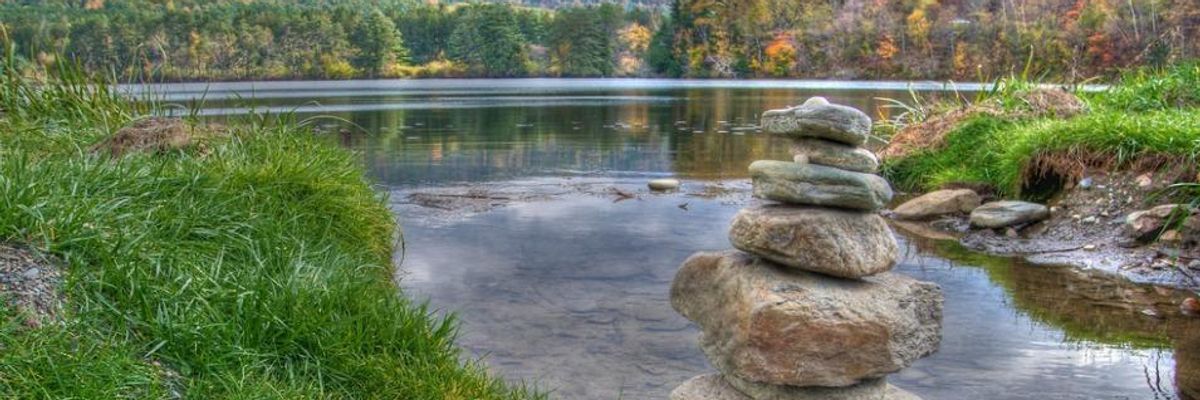Granville Beach was a secluded swimming hole on a snaky bend of the White River, the ideal place to meet Vermont neighbors on a hot summer day before 2011's Hurricane Irene. Now, the sandy shore, deep waters overhung with box elders, streamside wildflowers, and the lively buzz of riparian birds and dragonflies are gone.
Replaced by a shallow channel choked with silt and shattered trees, lined by eroded clay banks topped by a tangle of Japanese knotweed - a foreign invader whose seeds filled almost every riverside plant niche after the storm.
America's rivers are changing, and not for the good. Their flows are being altered by global warming's wildly erratic precipitation shifts: torrential rains, floods and drought.
As climate models predicted decades ago, places that once got lots of rain, now often get more. Since the 1950's, Northeastern downpours have grown 74 percent heavier. They're 45 percent heavier in the Midwest, 26 percent heavier in the Southeast, and 21 percent on the Great Plains. Likewise, places that got less rain in past, now see intensifying drought.
A visit to California's Central Valley last spring, during the worst drought in 500 years, shocked me to my core. The San Joaquin River, a shadow of itself, was a trickling blue thread through barren sand. The vast San Luis Reservoir that irrigates the nation's most important farmland and supplies Silicon Valley drinking water was almost empty.
In the nearby High Sierra, where Great Sequoias have endured weather vagaries for millennia, the stress of global warming was also evident. The Kaweah River, fed on a steadily diminishing alpine snowpack, flowed at a fourth its normal volume. Its formerly wide streambed was dotted by 15-foot tall desert yuccas.
In the Southern Appalachians, climate change is overheating and degrading prime trout streams. The Midwest's Missouri River has altered its flow radically in the last 50 years, bringing severe water shortages to Montana and Wyoming, and flooding to the Dakotas. In the Southwest, 11 of the last 14 years have seen drought. Lake Mead, water source to 2 million Las Vegas residents, stands at 39 percent capacity, its lowest ever.
These extreme precipitation shifts are a double edged sword: Torrential rains increase runoff - dumping silt, topsoil, pesticides, road salt, sewage, and industrial contaminants including coal ash, oil, and natural gas fracking fluids, into rivers. Lack of rain hurts too: drought concentrates pollutants in shrinking volumes of water and promotes algae blooms that suffocate aquatic systems.
This isn't only a U.S. problem. In 1990 and again in 2012, the primitive Kogi tribe of Colombia, South America broke a centuries-long silence with modern humanity to serve us a warning. Keen observers of nature's interconnectedness, the Kogi warned that global warming is destroying the earth's rivers, the web of life, and the Great Earth Mother.
Ecologists and economists are starting to agree with them. The record Mississippi River floods of 2011 did $5 billion in damage. A year later, a near record drought saw the U.S. Army Corps of Engineers racing to blast a barge channel from river bedrock to keep the nation's vital cargo of corn, wheat and coal flowing.
Such mad hydrological mood swings are worsening as global warming escalates, hammering and shattering the world's great river systems. None go untouched.
Rivers, not dollars, are our nation's lifeblood. These vital arteries give us our drinking water, grow and transport our crops, provide energy, offer recreation and spiritual rejuvenation. They are sickening as the world warms. Their impoverishment threatens national security, the economy, ecology, and life itself.
A proactive response to climate change is needed now - but won't happen without you. So travel to your childhood swimming or fishing hole, to your "home stream", and see if it still flows sweetly or is lost to memory... perhaps forever.
We can protect our waterways from global warming, but not without a huge political sea change. After seeing the state of your "home stream", maybe you'll become part of the wave that will bring that change.
* * *
Send your "home stream" observations to the author at scherer@blueridgepress.com or comment here.
